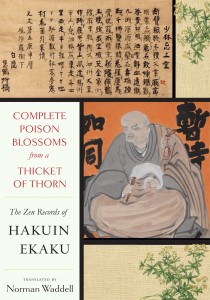Hakuin Zenji
Hakuin Zenji was born in Hara, Japan, on January 18, 1685. He began monastic studies as a teenager, studied with the great master Shōju Rōjin, and developed his teaching over a long career spanning more than fifty years. An enormously popular teacher during his lifetime, he died a few days short of his eighty–fourth birthday, in Hara where he had begun, and is said to have left more than 90 dharma heirs.
Subscribe to our newsletter for news & events from Counterpoint Press.
Books
Complete Poison Blossoms from a Thicket of Thorn
The Zen Records of Hakuin Ekaku
Following his translation of just over half the original text in 2014, Norman Waddell presents the complete teaching record of Zen master Hakuin, now available in English with extensive explanations, notes, and even the wry, helpful comments that students attending Hakuin’s lectures inscribed in their copies of the textWith this volume, Norman Waddell completes his acclaimed translation of the teaching record of one of the greatest Zen masters of all time, Hakuin Ekaku (1685–1769). Hakuin lived at a time when Japanese Buddhism as a whole and his own Rinzai sect in particular were at low ebb. Through tremendous force of character and creative energy, he initiated a reform movement that swept the country, and today, all Rinzai Zen masters trace their lineage through him. This outcome is all the more extraordinary because Hakuin’s base of operations was a small temple in the country town of Hara, where he grew up, not in one of the nation's political, cultural, or commercial centers.
This book represents the first full publication of the Keisō Dokuzui in any foreign language. Inspired by the enthusiastic reception that greeted his 2014 selections from the text, Waddell returned to work and now gives us the opportunity to examine the entirety of Hakuin's record and to benefit as never before from the example and instruction of this exuberant personality and remarkable teacher. Poison Blossoms contains a highly diverse set of materials: formal and informal presentations to monastic and lay disciples, poems, practice instructions, inscriptions for paintings, comments on koans, letters, and funeral orations. While most items are brief, easily read in a quick sitting, the book also includes extended commentaries on the Heart Sutra, one of Mahayana Buddhism’s central texts; on the famously difficult Five Ranks of Tung–shan; and on the accomplishments of his eminent predecessor Gudō Tōshoku.
Having devoted himself for more than three decades to the study and translation of Hakuin's works, Norman Waddell is peerless when it comes to conveying into English the vital, sometimes elegant, often earthy voice of this outstanding teacher. His command of the subject enables Waddell to elucidate the vast array of idioms and images that Hakuin employed to enliven his poetry and prose—historical and mythological elements, street slang, doctrinal and cultural allusions that would otherwise place these writings beyond the grasp of anyone but a specialist. Waddell's five previous Hakuin translations, each important in its own right, can now be recognized as stepping stones to this towering achievement.

Catapult | Counterpoint | Soft Skull
20 Jay Street #704
Brooklyn, NY 11201
646.926.0805 | contact@catapult.co





